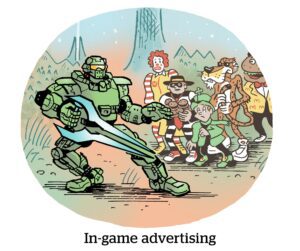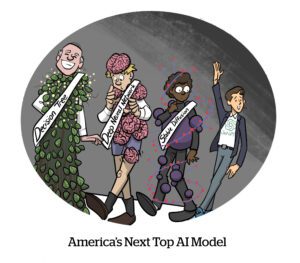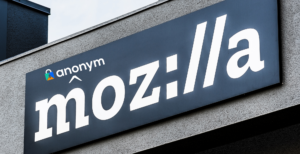It’s like ChatGPT, but for ads.
AdGPT, a startup that uses AI to automatically create hundreds of ads across Facebook, Instagram, Taboola, Outbrain, Google, LinkedIn and X, came out of stealth mode on Wednesday.
An advertiser can enter a URL into the AdGPT site, upload a brief or write a quick prompt, such as “I have a special offer this weekend for 30% off in Brooklyn,” and click to generate a variety of ad creative options.
The more the advertiser uses the tool, the more AdGPT learns the brand identity and adapts to the marketer’s tastes through “usage and feedback loops,” said Eilon Zarmon, CEO and co-founder of AdGPT. “Each interaction refines its understanding of preferred colors, tone and visual styles.”
For instance, if a company continually tweaks the AI-generated ads to get to a more formal brand voice, AdGPT will modify its language model to reflect this preference in future campaigns, he said.
AdGPT’s target clients are small to midsize businesses (SMBs). Many SMBs can’t afford to hire an agency, according to Zarmon. AdGPT aims to give SMBs a fast, affordable ad agency replacement. Clients can sign up for monthly or annual AdGPT subscriptions.
Though it currently doesn’t have clients because it hasn’t launched yet, “friends and family” of Zarmon’s eponymous Tel Aviv-based advertising agency, Zarmon Group, have tested out the tool, he said.
What lies beneath
The AdGPT algorithm is built on existing large language models (LLMs) from the likes of Google, OpenAI and Stable Diffusion. The company blends a variety of open-source models with its in-house model to achieve its desired results.
The tool also uses a combination of machine learning techniques, including natural language processing, computer vision and deep learning models, to train on thousands of successful ads from the AdGPT founders’ past campaigns. Because of this ability to train on successful ads, AdGPT’s AI-generated ads have “proven that they convert better,” Zarmon claimed.
AdGPT uses computer vision techniques that break down and analyze the textual and visual elements of ads, while the deep learning models discern patterns and styles that perform well on different platforms.
Many ad creatives have fretted that AI could make them lose their jobs. After generative AI rocketed into the public eye, “we had a meeting here in the agency with our guys in the digital department” that gave rise to the idea of AdGPT,” Zarmon said, who runs the ad agency Zarmon Group. They hired developers and a CTO and spent about 10 months training the tool.
Training the tech meant tapping into the collective ad industry experience of Zarmon and his three co-founders. They have fed their decades of knowledge of creative tactics and best practices, such as headline size and “the right color for the right offering,” into AdGPT.
Looking ahead
As for what’s next, AdGPT has a couple more tools in the works that will complement the existing product, according to Zarmon. The company will soon release an AI-powered cross-platform optimization tool that adjusts ad budgets based on which platform is delivering the best ROI.
“When you go to Meta or Google, every platform is doing the optimization for themselves,” Zarmon said. “Meta and Google are not going to help each other, because they are competitors.” So there is a need for a neutral optimization tech.
Eventually, the goal is for the cross-platform optimization tool to integrate with all the ad platforms, but Meta, Google and Bing will be the initial focus, Zarmon said.
The startup is also working on a rating feature that will rank the AI-generated ads and suggest the best choices for advertisers.
Pre-launch, Zarmon Group provided AdGPT with $1 million in pre-seed funding. But in Q4, the bootstrapped startup plans to raise money to expand its 12-person team and product offerings. For instance, AdGPT wants to branch into video ads.
“We realized we needed to move very fast because, one day, [AI] will replace us,” Zarmon said. “If you can’t beat them, join them.”















